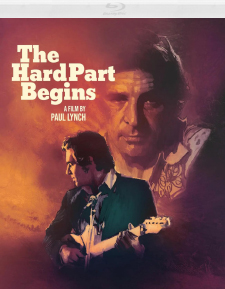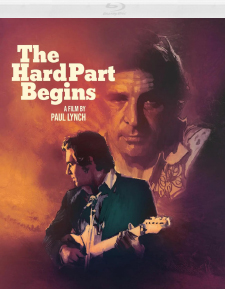Hard Part Begins, The (Blu-ray Review)

Director
Paul LynchRelease Date(s)
1973 (October 31, 2023)Studio(s)
Odyssey/Cinépix (Canadian International Pictures/Vinegar Syndrome)- Film/Program Grade: A-
- Video Grade: A
- Audio Grade: A
- Extras Grade: A
Review
A pleasant surprise, The Hard Part Begins (1973) is a low-budget but effective Canadian-made character drama about a middle-aged country and western singer playing small-town bars in Western Ontario. The film reminded me of John Huston’s Fat City, made the year before, about smalltime boxers in Stockton, California. Both pictures are about losers, talented but stuck forever at the bottom rungs of their respective fields. Indefatigable characters, they keep trying and trying to break through into the big leagues, but economic and personal set-backs, like that children’s game Chutes & Ladders, keep sending them sliding back to the bottom of the heap.
The film stars busy Canadian actor Donnelly Rhodes as Jim King, whose King & Country band is barely surviving as more and more venues switch from country and western to rock bands. Jim’s current girlfriend, Jenny (Nancy Belle Fuller), does backup vocals and plays guitar like Jim while Wayne (Paul Bradley) is on lap steel and harmonica. Hank (Neil Vipond), their drummer, is in hospital with an apparently terminal illness, so Lou Roxton (Robert Hawkins), a pot-smoking rock drummer, unhappily fills in until something better comes along.
The band gets around in a rusting VW Bus on its last legs, the vehicle needing repairs Jim can’t afford. Further, available gigs are at dive bars so small there’s hardly room for the band, gigs even Spinal Tap (or maybe Anvil) at their nadir would’ve turned down. In the film’s most effective moment, the camera has Jim singing his heart out as the camera slowly tracks backward, revealing that he’s playing to an audience of maybe ten people.
The Hard Part Begins is mostly a character study, following Jim around as he patiently listens to his auto mechanic yammer on about his dream to someday play drums in a band like Jim’s; Jim visiting his bitter ex-wife and, later, suicidal teenage son, locked away in reform school. Playing his long-ago hometown, locals that remember Jim come to visit, including an old classmate still carrying a torch for the still-ruggedly handsome singer, she clearly imagining his life far more glamorous than it really is. He dodges an angry man named Dawson (Doug McGrath, a regular in Clint Eastwood movies for a time), who accuses Jim of knocking up his sister. Late in the film a record label calls Jim in for a meeting, but that turns into yet another disappointment on multiple levels.
The picture was made for just $95,000 and shot in 16 mm yet looks quite good and plays like a small but professionally-made studio film. A few of the bit parts are obviously played by non-actors, including a couple of terrible ones, and it’s a little rough in minor ways, such as when Jim visits Hank in the hospital, Vipond is so pasty-faced with white makeup he looks like a zombie in a George Romero film. For the most part, though, the picture is polished with especially good audio (derived from the original mono magnetic final mix) for the band’s songs. The 4K (and 1.85:1) restoration of the original 16 mm camera (reversal) negative is impressive; yes, the film is somewhat grainy, but I’ve seen transfers of 35 mm productions not half as good as this. English subtitles are available.
Donnelly Rhodes (1936-2018), born in Winnipeg, had major success in Canadian film and TV, so much so that he often worked in Hollywood productions, including features like Butch Cassidy and the Sundance Kid but mostly on TV, from the original Mission: Impossible to an amusing continuing character on the sitcom Soap. Later, he was often cast in Hollywood productions shot in Canada to save money, perhaps most memorably as the acerbic, chain-smoking Dr. Cottle on the rebooted Battlestar Galactica, which won him many new fans. He’s entirely credible here, his performance having an almost documentary-type realism and I was surprised, reading the end credits, that his singing voice was dubbed by Zeke Sheppard. (Jenny’s vocals were dubbed by Louise Gadzala, disappointing the actress.)
Canadian International Pictures has done a fine job with both the transfer and the gobs of extra features accompanying it. They include: an audio commentary by director Paul Lynch and former TIFF programmer Steve Gravestock; an audio commentary by Paul Corupe and Jason Pichonsky; A Filmmaker Begins, a 26-minute interview with Lynch; After the Hard Part, a 14-minute career overview with Lynch; Evolution of a Cinephile, a 9-minute piece again with Lynch; An Actor Begins, a 22-minute featurette with David Daniels (who plays Jim’s son); The Easy Parts Await, a 12-minute featurette by Daniel Kremer on Lynch’s early career; Reyes on Rhodes, with writer Amanda Reyes on actor Rhodes; a 4-minute 1989 interview with Rhodes for Canadian television; audio interviews with producer Hugh Curry (17 minutes) and editor William Gray (14 minutes) and a 9-minute Afterword with Lynch and Gravestock. Also included is a booklet interview with actress Fuller.
The Hard Part Begins is a neat little find. Perhaps not a lost masterpiece, but nevertheless a very well-made, worthwhile little character study set in the small-town Canada of half a century ago. Highly Recommended.
- Stuart Galbraith IV

